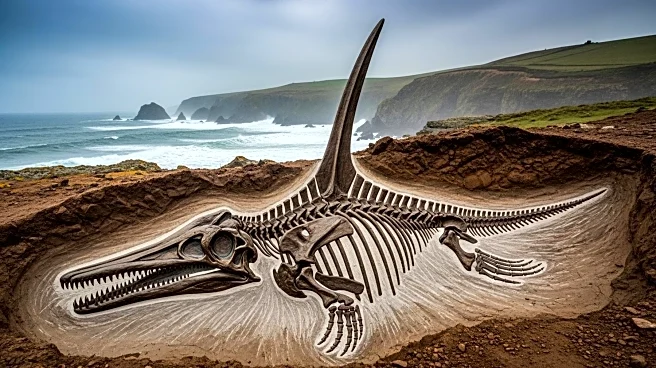What's Happening?
A near-complete skeleton of a new ichthyosaur species, named Xiphodracon goldencapensis or the 'sword dragon of Dorset,' has been discovered on Dorset's Jurassic coast. This dolphin-sized marine reptile, dating back 185 million years, is the only known example of its kind. The fossil was first found in 2001 and has been analyzed to reveal unique features, including a prong-like bone near its nostril and a long sword-like snout. Scientists suggest the 'sword dragon' may have been killed by a bite from a larger ichthyosaur species, indicating the dangerous nature of Mesozoic oceans.
Why It's Important?
The discovery of Xiphodracon goldencapensis provides valuable insights into ichthyosaur evolution and the biodiversity of prehistoric marine life. This new species helps fill gaps in the fossil record, offering clues about the ecological dynamics of ancient oceans. The findings contribute to our understanding of marine reptile adaptations and their interactions with predators, enhancing knowledge of evolutionary processes. The discovery also highlights the importance of fossil preservation and the role of paleontology in uncovering Earth's history.
What's Next?
Further analysis of the 'sword dragon' fossil may reveal more about its physiology and ecological role. Researchers may continue to explore the Jurassic coast for additional fossils, potentially uncovering more new species. The findings could lead to collaborations between museums and research institutions to study ichthyosaur evolution and promote public interest in paleontology.
Beyond the Headlines
The discovery underscores the significance of fossil hunting and conservation efforts in preserving Earth's natural history. It also raises questions about the impact of climate and environmental changes on marine life, both in the past and present. The study of ancient species like the 'sword dragon' can inform current conservation strategies for marine ecosystems.









